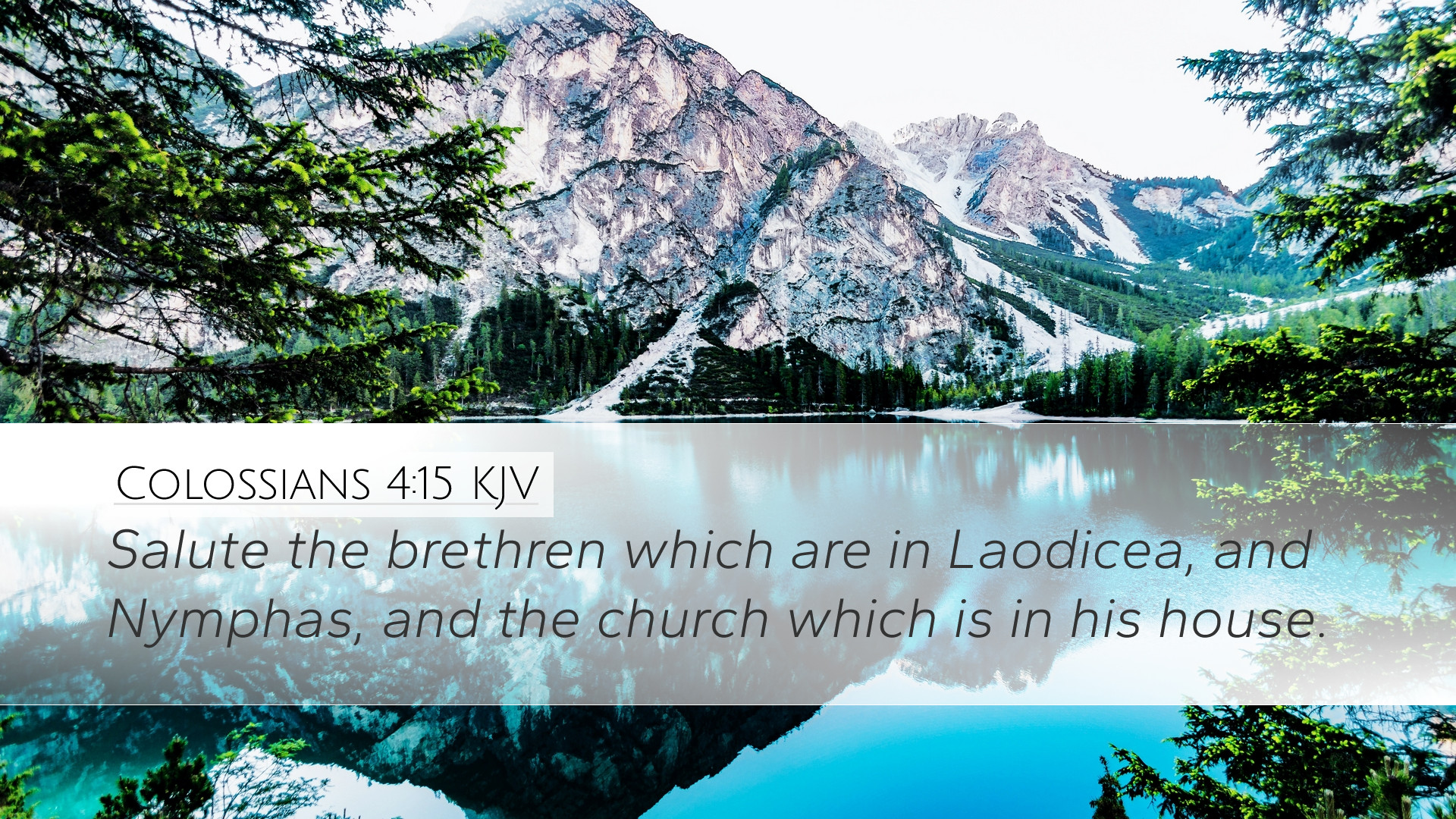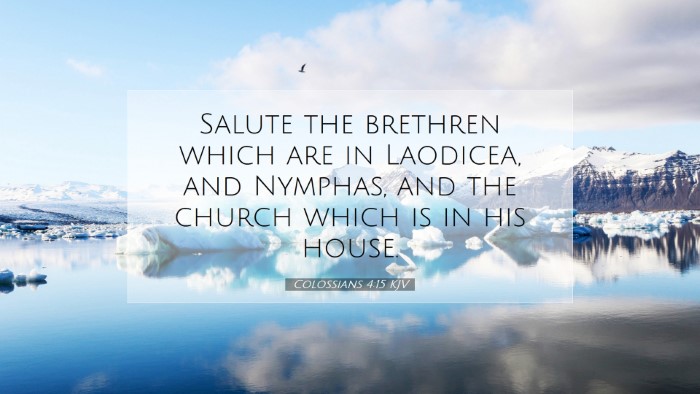Old Testament
Genesis Exodus Leviticus Numbers Deuteronomy Joshua Judges Ruth 1 Samuel 2 Samuel 1 Kings 2 Kings 1 Chronicles 2 Chronicles Ezra Nehemiah Esther Job Psalms Proverbs Ecclesiastes Song of Solomon Isaiah Jeremiah Lamentations Ezekiel Daniel Hosea Joel Amos Obadiah Jonah Micah Nahum Habakkuk Zephaniah Haggai Zechariah MalachiColossians 4:15
Colossians 4:15 KJV
Salute the brethren which are in Laodicea, and Nymphas, and the church which is in his house.
Colossians 4:15 Bible Commentary
Commentary on Colossians 4:15
Verse: "Give my greetings to the brothers at Laodicea, and to Nympha and the church in her house."
This verse concludes Paul’s instructions and personal greetings in his epistle to the Colossians. The Apostle Paul is known for his pastoral heart and his desire for unity among the believers. Here, he emphasizes the importance of fellowship and community in the faith.
1. Contextual Background
The city of Laodicea, where Nympha resided, was a significant location during the early church period. It was known for its wealth and commerce, yet it faced spiritual challenges that Paul addresses in his letters. Understanding the context of the church in Laodicea enhances the depth of Paul's message.
2. Greeting to the Brethren
Paul’s directive to "give my greetings to the brothers at Laodicea" highlights the practice of sending salutations among Christian communities. The term "brothers" signifies a familial bond among believers, emphasizing unity in Christ.
Insights from Commentaries
- Matthew Henry: Henry elaborates on the importance of brotherly love and mutual encouragement among the churches. He suggests that greetings serve to reinforce the connection between different congregations, reminding them that they are part of one body in Christ.
- Albert Barnes: Barnes notes that Paul’s mention of Laodicea serves as an admonition for Christians to remain connected. He indicates that the early church thrived on cooperation and shared resources, fostering a strong sense of community.
- Adam Clarke: Clarke points out that sending greetings is an act of recognizing and supporting fellow believers in their faith journeys. In particular, he emphasizes that personal interactions and acknowledgments helped to strengthen the church amidst trials and external pressures.
3. Nympha's Role
The reference to Nympha, a woman of prominence in the early church, also provokes a discussion regarding the place of women in leadership roles within the body of Christ. Her hosting of the church in her home reflects dedication and hospitality.
Roles of Women in Early Church
- Matthew Henry: He reflects on the transformative role of women in the church, noting how their leadership and hospitality were vital in promoting the spread of the Gospel.
- Albert Barnes: Barnes treats Nympha as a model of faithfulness and service. He asserts that having church meetings in private homes, particularly those of women, was not uncommon and reflects the inclusive nature of early Christian gatherings.
- Adam Clarke: Clarke affirms the significance of Nympha's house, suggesting that such homes acted as sanctuaries for believers to gather, pray, and grow in faith.
4. The Church in Her House
Paul acknowledges not just individuals, but the collective body of believers meeting in Nympha's home. This aspect demonstrates the grassroots nature of early Christianity, where the church often met in domestic settings.
Theological Implications
- Unity and Fellowship: Paul’s encouragement for greetings reflects the unity that believers should embody, overcoming cultural and personal differences to focus on their shared faith.
- House Churches: The mention of a home church speaks to a model of church that prioritizes community, intimacy, and personal relationships, diverging from the more institutionalized forms of worship that would develop later.
- Encouragement and Support: By recognizing particular individuals and communities, Paul elevates the importance of encouraging one another, which is essential for spiritual growth.
5. The Broader Implications for the Church Today
The message of Colossians 4:15 transcends its historical context, providing insight for today’s church. Pastors, students, theologians, and scholars can draw several practical applications:
Lessons for Modern Believers
- The Importance of Community: Like Nympha, believers should strive to create spaces for fellowship, whether through home groups or other communal gatherings.
- Recognizing Contributions: Acknowledging the roles of individuals in the church, especially women and those in less visible positions, contributes to a holistic view of ministry.
- Fostering Connections: Greetings and communications among different congregations highlight the need for churches to work together in mission and support one another, building a unified body of Christ.
Conclusion
Colossians 4:15 serves as a poignant reminder of the relational aspect of church life championed by Paul. Through the context of greetings, the acknowledgment of Nympha, and the model of house churches, we are invited into a deeper understanding of community in Christ. The insights from public domain commentaries provide a rich tapestry of understanding, encouraging us to embrace fellowship, collaboration, and shared faith as integral components of our spiritual journey.


